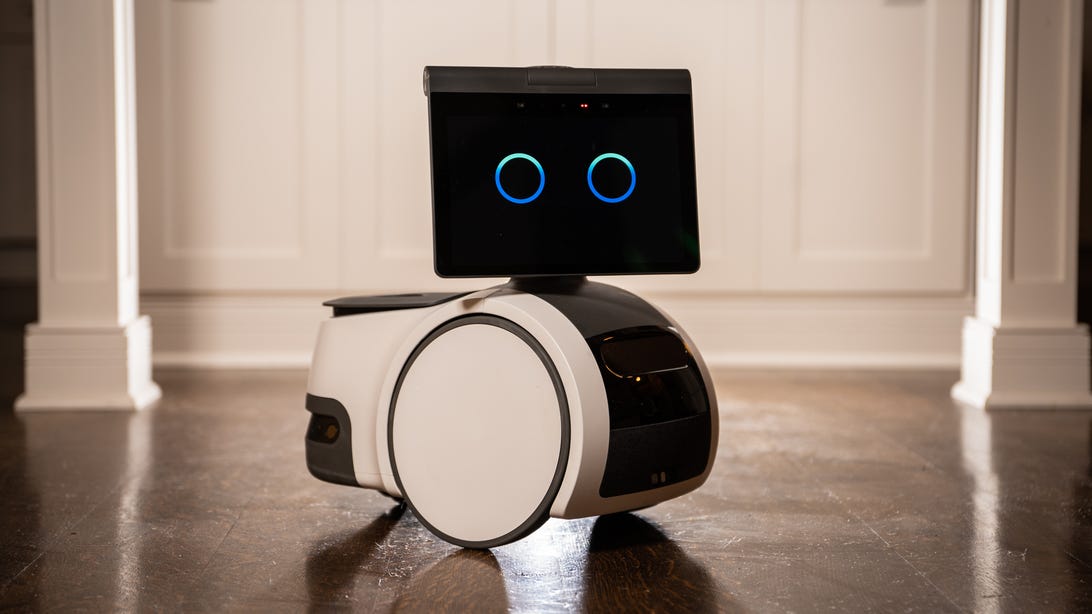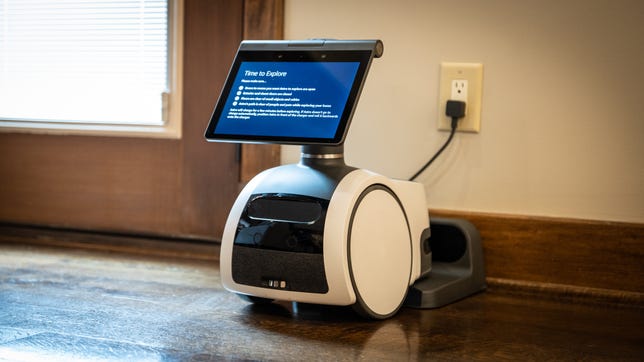
Amazon Astro is warmer and fuzzy than Alexa. This could change the way you think about Amazon’s services.
Chris Monroe/CNET
Amazon Astro combines many devices into one. The camera on the rolling home robot brings the company’s Ring safety features indoors for Ring Protect Pro users. Its microphone allows the popular Alexa voice assistant to move with you throughout the day. The robot’s face doubles as a connected tablet that can make video calls.
Astro’s killer app, however, might be its ability to spark an emotional connection with users. The puppy-shaped robot is intentionally cute, rather than sleek and cool. Its face, with cute animated eyes, rotates as it seeks you to send you a reminder of a loved one. It delivers snacks to those in your home. It even dances when asked.
Of course, Astro has practical uses. It can patrol your home or let you check for disturbing sounds by flipping over and raising a mast-mounted camera. However, these features pale in comparison to its lovely presence. What sells Astro is the hug factor, not its ability to scan the faces of visitors to your home.
We know that robots have no life. Still, we can’t resist seeing them as living creatures, despite the mechanical rotation that proves they’re just wire, plastic, and glass. Robotics have discovered that we bond with them because they move and respond to us, prompting us to instinctively see them as part of our family. We grieve for discontinued robots when companies end support for them, but we don’t grieve for a malfunctioning Echo puck or Siri tablet. (Funerals were held for the Aibo robot dog.)
“We’ve realized that what’s really interesting is social relationships,” said Kate Darling, a robotics expert at the MIT Media Lab. “It’s the use case, not that you can order pizza with it.”
Personal robots are not new. Sony launched Aibo in 1999, and the robot dog is now in its fourth generation. A nursing home uses a robotic seal called Paro to soothe elderly patients with autism. Jibo, a stationary personal robot with purely social capabilities, debuted in 2017, but its future remains unclear since its maker collapsed in 2019.
There are already 19 million self-propelled vacuums in American homes, making them one of the most advanced personal robots available. Personal robotic machines designed to entertain, protect and connect us have yet to take off. Before Astro, the closest thing was probably Ballie, a concept robot that Samsung showed for two years that resembled a tennis ball and interacted with smart devices. As fascinating as Ballie is, the device isn’t on sale yet.
Amazon has already made a handful of markets succumb to its mighty gravitational pull. The e-commerce giant has transformed online shopping, and its Kindle e-reader and Amazon Alexa voice assistant are benchmarks in their respective categories. Its entry into the realm of personal robotics could have a huge impact on our expectations and acceptance of domestic robots.
Amazon unveiled Astro at its annual device and services event in September. It is unclear how many Astronauts have been sold. The bot is currently priced at $999 and can only be purchased via Amazon’s invite (interested shoppers can request an invite). Once available for general purchase, the price will rise to $1,450. In an ongoing review of the robot, CNET’s David Priest said Astro’s personality is really interesting, but it’s still unclear if the device is useful or just a gimmick.
The company has borrowed from science fiction depictions of robots as its Astro plans take shape. But Amazon says animals are also a top consideration because of how people respond to all shapes and sizes.
“People really appreciate the smaller, pet-like form factor we end up with,” said Anthony Robson, Amazon’s head of Astro product, adding that taller robots “feel more There is majesty or deterrence.”
Design decisions are based on years of research in robotics. Animal-like robots control people’s expectations. For example, you don’t want your cat to do the dishes. Using an animal form also allows Amazon to avoid a potentially uncomfortable reaction from users that might reject a device that looks a little too human, but inanimate.
A robot pet that knows your secrets
Animal-like robots have been used to soothe anxious adults and reduce social challenges faced by children with autism. They have been used as educational aids to help students practice language skills through personalized lessons.

Astro is docked in its charging station.
Chris Monroe/CNET
If Astro is like a pet, it’s still a pet that can report you to the family. Like other bots, Astro will collect data as it generates rapport. Questions about privacy and concerns about potential abuse surround the way Astro is doing the same as they do with other data-hungry devices.
Even before you start connecting with Astro, you’re prompted to provide Amazon with a lot of personal information. This includes biometric scans for its Visual ID facial recognition, a map of your home, and data about how you move and where you tend to hang out.
Amazon said most of the data will remain on the device. Facial scans are not sent to companies, nor are the data to teach Astro’s machine-learning software how to move around the home.
Other information, such as camera recordings and conversations with Astro’s onboard Alexa, will be transmitted over the Internet, which requires Amazon to secure it on its own systems. Like any Alexa-enabled device, purchases made through Astro will be paired with your Amazon shopping history, affecting the product recommendations and ads you see on the company’s website.
“At Amazon, customer trust is at the heart of everything we do and is critical to inventing devices and services that help improve our customers’ lives,” Amazon said in a statement.
Astro will almost certainly fascinate kids, who will be mesmerized by the robot’s cartoon-like face and its ability to follow them when commanded. This is an area of concern for watchdog groups, as children are more vulnerable to advice than adults. The scientists found that robots could often convince children to identify the smaller of the two images as the larger, and that children were more susceptible to this manipulation than adults.
David Monaghan, an advocate for the watchdog group Fairplay for Kids, said the appeal of robots to the youngest members of society meant we had to be very careful about Astro’s tips for kids. If Astro hovers near children, the robot may prompt them to spend more time interacting with the robot’s voice assistant or screen, which could take away from their time spent playing creatively in the real world, he said.
“They designed Astro to be a warmer, fuzzier version of Alexa,” Mohan said. “It can be very influential.”
Get the CNET Home Newsletter
Get the latest news on smart home products and trends to modernize your home. Ships Tuesday and Thursday.










